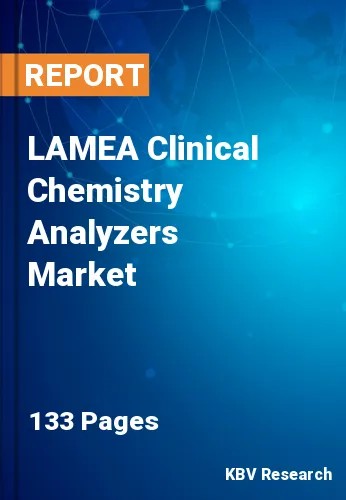The Latin America, Middle East and Africa Clinical Chemistry Analyzers Market would witness market growth of 9.2% CAGR during the forecast period (2023-2030).
Clinical chemistry analyzer sales are being driven by point-of-care testing. Both technology developments and patient reference are the driving forces behind point-of-care testing. To produce goods with newer, more cutting-edge technologies, manufacturers are always advancing their research and development efforts. In the case of chemistries, blood gases, electrolytes, and hematology, for example, sensor technologies allow for the quick analysis of blood samples for these critical care assays.
CTCs can be effectively separated from whole blood because of technological advancements like next-generation microfluidic devices. The turnaround time for analysis is quick owing to these devices' reduced reagent and sample consumption requirements. Clinical chemistry analyzers have become more popular due to technological developments in point-of-care testing equipment.
The well-known improvements and automated analyzers' advantages include automatic data acquisition, improved process control that enables real-time automation, effective parameter monitoring, as well as automatic variable adjustment. According to estimates, these advantages will influence physicians' preferences for these analyzers, offering high-potential prospects for market growth in the coming years.
Additionally, the region is seeing a rise in cancer incidence. According to estimates, there are approximately 700,000 cancer deaths and 1.5 million new disease cases in Latin America each year. According to age standardization, the incidence and death rates were 186.5 and 86.6 per 100 000, respectively. Prostate cancer, colorectal cancer, lung cancer, stomach cancer, and non-melanoma skin cancers combined to make up almost 15% of all new cases of cancer in Latin America and the Caribbean in 2020. Lung cancer remains the leading cause of death (12% of all cancer fatalities), despite wide regional variations in incidence rates. Government expenditures on healthcare infrastructure are also anticipated to help the sector. During the predicted period, it is also estimated that demand for analyzers would increase due to rising consumer awareness of healthcare and fitness issues as well as a growing belief in preventative healthcare practices. Consequently, this region presents the market with many prospective options.
The Brazil market dominated the LAMEA Clinical Chemistry Analyzers Market by Country in 2022, and would continue to be a dominant market till 2030; thereby, achieving a market value of $335.6 million by 2030. The Argentina market is showcasing a CAGR of 9.8% during (2023 - 2030). Additionally, The UAE market would register a CAGR of 8.9% during (2023 - 2030).
Based on End User, the market is segmented into Hospitals & Clinics, Diagnostic Laboratories, Research Laboratories & Institutes, and Others. Based on Test Type, the market is segmented into Basic Metabolic Panel, Renal Profile, Liver Panel, Lipid Profile, Thyroid Function Panel, Electrolyte Panel, and Specialty Chemical Tests. Based on Product, the market is segmented into Reagents, Analyzers, and Others. Based on countries, the market is segmented into Brazil, Argentina, UAE, Saudi Arabia, South Africa, Nigeria, and Rest of LAMEA.
Free Valuable Insights: The Worldwide Clinical Chemistry Analyzers Market is Projected to reach USD 16.1 Billion by 2030, at a CAGR of 5.2%
The market research report covers the analysis of key stake holders of the market. Key companies profiled in the report include F. Hoffmann-La Roche Ltd., Danaher Corporation, Abbott Laboratories, Thermo Fisher Scientific, Inc., Siemens Healthineers AG (Siemens AG), Horiba Ltd., Sysmex Corporation, Hitachi, Ltd., EKF Diagnostics Holdings plc and Ortho-Clinical Diagnostics, Inc. (QuidelOrtho Corporation).
By End User
By Test Type
By Product
By Country
Our team of dedicated experts can provide you with attractive expansion opportunities for your business.

